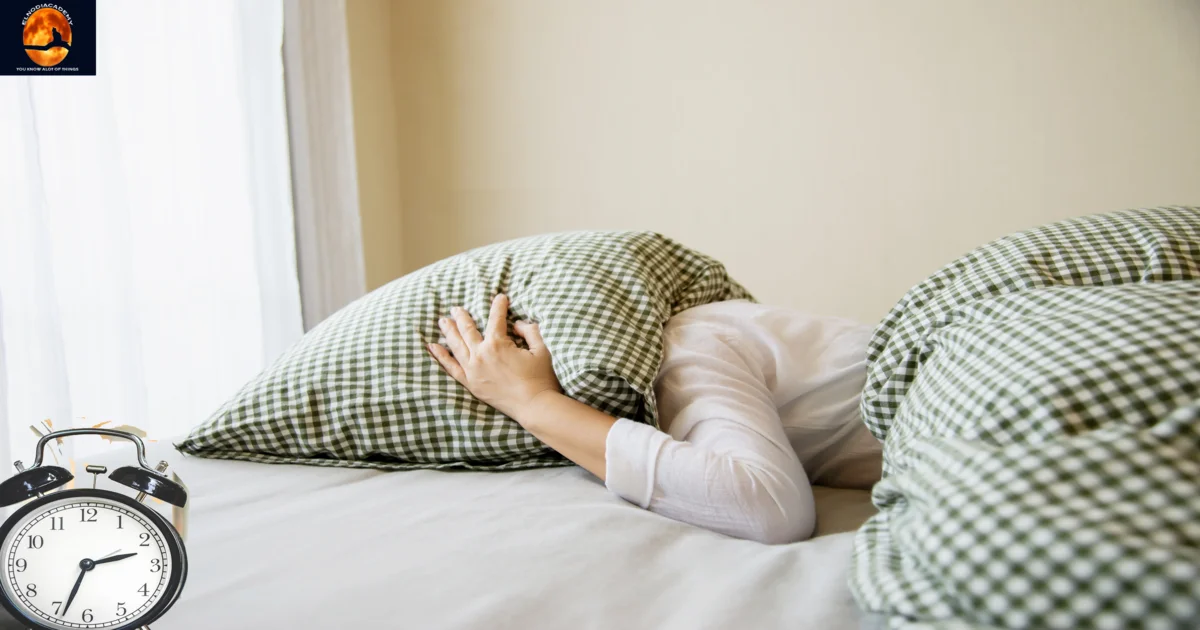Sleep disorders affect millions of Americans every year. They include insomnia, narcolepsy, restless leg syndrome, obstructive sleep apnea, and other conditions. The good news is that we can often effectively manage these problems through lifestyle changes or medical treatments.
There are several reasons someone might experience a sleep disorder. Some of them are physiological (e.g., aging), some psychological (e.g., stress), and some environmental (e.g., noise). In addition, certain medications can cause sleep disorders issues.
sleep disorder definition

We consider sleep one of the complex and important processes in the restoration and renewal of the body.
It is also necessary for some physiological processes, such as organizing and processing experiences and integrating memories, and the importance of sleep appears through the negative effects that patients suffer from, such as physical and psychological problems, and in the process of sleep disruption.
Daily body changes, affect sleep such as physical and mental changes that occur within 24 hours, and nerves that respond to light, hormones, and heat regulate these changes. And waking normally.
We define sleep disorders as a disturbance in the quality or time of sleep. We estimate the number of sleep disorders in the primary health care unit at 10-20% of patients, and sleep disorders are associated with Closely related to both physical and psychological problems.
Sleep disturbances may be a symptom of mental illnesses, and may be considered one cause of some psychological conditions, or cause their severity to increase.
Types of sleep disorders
We can mention some types of sleep disorders:
Insomnia:
We define insomnia as having difficulty falling asleep or continuing to sleep. Among the symptoms of insomnia: waking up very early, waking up during the night, having difficulty returning to sleep, and feeling tired upon waking.
Hypersomnia :
Hypersomnia can be defined as falling asleep for a long period, or excessive sleep during the day, in which the patient has trouble staying awake while performing his work, or even while driving, and the patient also suffers from the effects.
And other symptoms of this problem, such as experiencing difficulty in thinking, concentrating, and feeling a lack of energy in the body.
Parasomnia:
The definition of parasomnia includes strange events that may occur during sleep apart from sleep apnea, such as sleepwalking, nightmares, sleep paralysis, sleep-related eating disorders, and sleep aggression.
Movement disorders during sleep:
This disorder includes several disorders that cause the body to move before or during sleep, resulting in difficulty falling asleep, staying asleep, or enjoying restful sleep, and movement disorders during sleep include:
- Restless legs syndrome.
- Repetitive limb movement.
- Leg cramps during sleep.
- Rhythmic movement disorder.
- Teeth grinding.
Daily stress disorders:
These disorders include confusion in the time and times of sleep, and these disorders can be summarized:
Sleep-related breathing disorders:
These disorders lead to problems with breathing during sleep, and we often relate the cause of these disorders to a blockage or narrowing in the upper part of the respiratory system, and these disorders vary in how they affect both breathing and sleep.
Some of them may appear as partial and intermittent obstruction of the airway during sleep, causing snoring without affecting the quality of sleep, and in other cases, it may appear as a frequent interruption of breath accompanied by a lack of oxygen, causing sleep disturbance, and resulting in a feeling of drowsiness during the day.
Causes of sleep disorders

Suffering from some health problems There are many diseases and chronic health problems that can negatively affect the continuation of sleep at night and may lead to suffering from interrupted sleep, the most prominent of which are the following, knowing that it is more common among the elderly:
1. Anxiety or depression:
Anxiety or depression can make it difficult to sleep at night and may even make it difficult to fall asleep.
2. Neuropathy
Neuropathy may cause tingling, numbness, or pain in the hands and feet, which leads to frequent awakenings at night.
3. Sleep apnea
Sleep apnea is when breathing stops for a short period during sleep at night, which leads to a feeling of sleepiness during the day, and some other symptoms and signs that may show sleep apnea, such as:
- Loud snoring while sleeping.
- Interrupted sleep or getting up for short periods during the night.
4. Parkinson’s disease
Parkinson’s disease may cause movements throughout the body that impede the sleep process.
5. Alzheimer’s disease
Some people with Alzheimer’s disease may become agitated during their normal sleeping hours.
6. Allergies and respiratory problems
Allergies, colds, and other upper respiratory infections may make it difficult to breathe at night, which may cause difficulty sleeping or staying asleep.
7. Frequent urination
Nocturnal urination or frequent urination may hinder the continuation of sleep at night, by causing frequent awakenings during the night. Health problems may lead to suffering from frequent urination, such as diabetes, and an enlarged prostate gland.
8. Chronic pain
Persistent pain may make it difficult to fall asleep and may even lead to waking up at night, Here are some of the most common causes of chronic pain:
- Arthritis.
- Chronic fatigue syndrome.
- Fibromyalgia.
- Inflammatory bowel disease (IBD).
- Constant headache.
- Constant lower back pain.
9. Heartburn or gastroesophageal reflux disease
Both of them occur because of the acidic juice backing up from the stomach towards the esophagus, causing irritation and a painful burning sensation, which may make it difficult to fall asleep and may also hinder the maintenance of sleep at night.
10. Eating disorders
Eating disorders may cause interrupted sleep, and these disorders include:
- Loss of appetite: Anorexia leads to an impediment to the normal sleep pattern, because of malnutrition and excessive weight loss.
- Bulimia nervosa or bulimia: Bulimia is an eating disorder that is often represented by binge eating during the day and then getting rid of what we ate during the night, which ultimately leads to the impediment of a good night’s sleep.
11. Cardiovascular diseases
Some cardiovascular diseases may cause interrupted sleep, and can be stated as follows:
- Coronary artery disease: Coronary artery disease leads to fluctuations in the biological clock, which leads to the person in question suffering from chest pain, irregular heartbeat, or even a heart attack during sleep.
- Congestive heart failure: Congestive heart failure prevents the heart from pumping enough blood to reach all parts of the body, and as a result, excess fluid builds up around the lungs while lying down, causing the sufferer to wake up repeatedly during the night.
12. Kidney diseases
The function of the kidneys is to filter blood from waste products. In the event of kidney disease, this function is disturbed and disturbed, which leads to suffering from symptoms and health problems that affect the life of the affected person. Such as insomnia or restless legs syndrome, or RLS.
13. Thyroid diseases
Imbalances affecting the thyroid gland affect sleep; In fact, we can diagnose these imbalances through a simple blood test, and we showed they can be controlled by taking medications that are prescribed by the doctor, and the effect of thyroid disorders on sleep follows:
Behavioral treatments for sleep disorders
We can mention some behavioral treatments that may help relieve the symptoms of some sleep disorders:
- Practicing resting exercises, which include progressive muscle relaxation, deep breathing techniques, and self-hypnosis.
- Cognitive therapy; aims to change the patient’s wrong thoughts, which may lead to his suffering from insomnia.
- Healthy sleep. Healthy sleep refers to a group of behaviors, habits, and environmental conditions to be observed when sleeping, which includes four main factors that can be detailed:
- Exercise, bedtime, naps, and exposure to light usually affect the daily frequency, which affects the time, number of hours, and quality of sleep.
- With age, it is normal to change the sleep pattern after the age of 40, as the suffering may wake up frequently during the night, which affects the quality of sleep, and the interaction with other health conditions that the patient suffers from, which may be the reason for awakening at night.
- Psychological influences, such as exams, work, and duties may affect the nature of sleep, so we recommend it to practice certain rituals that help a person separate these influences from bedtime.
- Caffeine, alcohol, and nicotine.
- Environmental factors, such as room temperature, darkness, and noise.
- Controlling the source of stress, and stressful conditions that may exist in the bedroom.
- Sleep restriction treatment. Sleep disturbances may result from staying in bed for long periods of time.
Sleep disorders in adults
Sleep disorders in adults refer to the problems that affect sleep in the elderly, including insomnia, intermittent sleep, and changing sleep schedules between night and day.
These are common conditions; Because of the occurrence of several organic and psychological changes in their bodies, which affects the nature of their sleep, and the most disturbed sleep experienced by the elderly is intermittent sleep, and insomnia comes in the second degree, which is associated with many psychological conditions, such as depression, and anyone exposed to injury it with age.
Especially since controlling the biological clock in the body becomes very difficult because most elderly people do not get enough sunlight.
Causes of sleep disorders in Adults
The elderly need fewer hours of sleep compared to young people and people in the youth stage, and the stage of entering a deep sleep is short for them compared to others, and this situation is considered very normal, but if it turns into a frequent and exaggerated state
These are sleep disorders, It has many reasons, the most important of which are:
- The presence of organic diseases, such as osteoporosis, rheumatoid arthritis, acid reflux into the esophagus, stomach acidity, chronic respiratory diseases, cardiovascular disease, and peripheral arteriosclerosis.
- Take short naps during daylight hours, as these naps are frequent.
- Sleeping too early results in waking up early as well.
- Decreased secretion of the hormone melatonin as a person gets older, which is the sleep hormone.
- Decreased exposure to sunlight.
- Adopt a sedentary lifestyle, full of lethargy and laziness.
- Having mental and neurological diseases, such as Parkinson’s disease, Alzheimer’s disease, depression, frustration, and boredom.
- Snoring, and taking some medications, such as diuretics force the elderly to get up several times at night to the bathroom.
Sleep disorders treatment in adults

The successful treatment is to treat the causes and prevention, which are:
- Treatment of organic, neurological, and psychological diseases of which the elderly complain and affect their sleep.
- Exercising during the day.
- Organizing and sticking to sleep and wake-up times.
- Not drinking stimulants at least four hours before bed, such as tea of all kinds, coffee, soft drinks, and instant coffee. And replace it with some drinks that help sleep, such as milk.
- Adjust the body’s biological clock by exposure to sunlight and spending time outside.
- Minimize small naps and sleep during the day.
Sleep disorders when pregnant
The problem of insomnia in pregnant women often occurs because of hormonal changes, and also because of the pressure of the uterus on its bladder, which makes the pregnant woman have to wake up more than once during the night in order to urinate, and the pregnant woman.
Also finds it is difficult to find a comfortable position to sleep in, especially when the increase in the fetus’s size and the lack of sleep in the pregnant woman is related to the level of the fetus’s activity.
As the active child deprives his mother of sleep, because of his constant movement, the lack of sleep may occur in the pregnant woman because of other sleep disorders in the pregnant woman, such as nasal congestion, heartburn, and other Annoying sleep disorders.
Also, many women may have disturbing dreams and nightmares during pregnancy, because of constant thinking and worrying about the health of their newborn, which causes insomnia.
Tips for insomnia when pregnant
Excessive thinking and fear of the problem of insomnia in a pregnant woman will only make the situation worse, so here are the most important tips that will help you relieve insomnia:
- Shower with warm water before going to sleep, or do some exercises that help relax the body.
- A pregnant woman’s massage by the husband helps a lot to get rid of insomnia.
- Ensure that the room temperature is appropriate, considering that the room is quiet and dark.
- Avoid drinking fluids in the evening and before bed.
- Exercising without stress and fatigue of the body.
- Sleep on the left side of the pregnant woman with the legs and knees bent, in order to relieve pressure on the large arteries and veins that carry blood from the legs and feet to the heart. This position also helps relieve and reduce pressure on the lower back.
- It is necessary to take periods of sleep during the day in order to compensate for the sleep that was lost during the night periods.
Reasons to see a doctor
It is worth consulting your doctor if you suffer from intermittent sleep for a long time or if it persists or worsens, and you should consult your doctor if any of the following problems or symptoms appear with intermittent sleep:
- Feeling very sleepy during the day.
- Mood changes during the day.
- Loud snoring, sometimes accompanied by gasping, choking, or other sounds showing abnormal breathing during sleep.
Summary
From the above, there are many causes and factors that may lead to sleep disorders, including Lifestyle factors, such as drinking alcohol and eating food close to bedtime, and drinking a lot of caffeine, and it is indicated that these factors can be controlled by making changes on the lifestyle followed.
Other causes of sleep disorders include age, suffering from some health problems, menopause, taking some types of medications, and other factors.
Symptoms and health problems with interrupted sleep; Loud snoring and feeling very sleepy during the day.
FAQ
Can sleep disorders cause seizures?
What percentage of people with ADHD also have sleep disorders?
can sleep disorders cause mental illness?
How do we know if we have a sleep disorder?
Latest posts
Exercise Lower Cholesterol: 7 Best Practices for Quick Results
Healthy High-Carb Foods: 8 Best Options for Energy Boost
Discover the best healthy high-carb foods that are both tasty and nutritious. Explore our top…
Foods to Avoid Migraines: 7 Proven Dietary Changes Needed
Foods to avoid migraines may be severe, interfering with everyday activities and productivity. While several…
Screen Headaches: 5 Steps to Prevent Digital Strain
Screen headaches have become increasingly common in the digital age, as we spend more time…
Block DHT: 6 Lifestyle Changes to Prevent Hair Thinning
Find out about 6 lifestyle modifications that effectively block DHT and stop hair loss. Find…
Hashimoto’s: Review, Foods, Vitamins, and Recommendations
Discover the optimal diet for managing Hashimoto’s disease. This comprehensive guide reviews essential foods, vitamins,…
Vicks Vaporub for health: Uses and Effectiveness Explained
Vicks VapoRub may help relieve cough and soothe sore muscles. Some anecdotal uses include relieving headaches,…
Vitamin E Fruits: Best 10 Sources for Health
Are you looking to boost vitamin E intake for better health and well-being? One of…
Chamomile Tea: 8 Amazing Health Benefits You Need
Chamomile tea is a popular herbal remedy known for its calming and soothing properties. But…
Daily Harvest: 8 Reasons to Try It Today
Are you looking for a convenient and nutritious way to fuel your body with delicious…
Sarsaparilla Tea Benefits: 10 Amazing Health Advantages
Discover the incredible sarsaparilla tea benefits with this comprehensive guide. From improving skin health to…
Sea Moss Benefits: Discover 7 Powerful Health Advantages
Have you heard about the amazing benefits of sea moss? This nutrient-rich seaweed has been…
Shrimp Tempura Secrets: 10 Tips for Success
Have you ever tried making shrimp tempura at home, only to have it turn out…
Keto Bread Crumbs: 7 Easy Homemade Variations
Are you following a keto diet and missing the satisfying keto bread crumbs in your…
Potato Starch: 3 Amazing Health Benefits Unveiled
Did you know that potato starch is not only a versatile ingredient in cooking, but…





